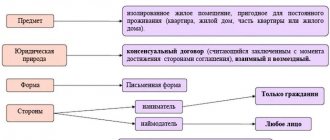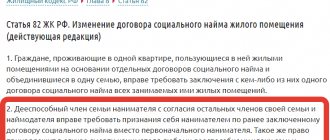One of the annual New Year's gifts to our legislative authorities on the eve of 2021 was the introduction of amendments to housing legislation regarding changes in the procedure for providing utility services to owners of non-residential premises. It would seem that the changes are positive and long overdue...
In accordance with paragraph 7 of the Government of the Russian Federation of May 6, 2011 N 354 “On the provision of utility services to owners and users of premises in apartment buildings and residential buildings” (hereinafter referred to as Rules 354) supply of cold water, hot water, electrical energy, thermal energy and gas into non-residential premises in an apartment building, as well as wastewater disposal are carried out on the basis of a resource supply agreement concluded in writing with the resource supplying organization
(hereinafter referred to as RSO), which must comply with the provisions of the legislation of the Russian Federation on water supply, sanitation, electricity supply, heat supply, gas supply.
RF PP No. 1498 obliged the owners of non-residential premises to enter into a direct agreement with the RSO
The rules for the provision of utility services in apartment buildings and residential buildings were approved by RF Government Decree No. 354. By Decree of the Government of the Russian Federation of December 26, 2016 No. 1498, important clarifications and changes were made to these rules, including the obligation of owners of non-residential premises to enter into resource supply agreements directly with the RSO.
Paragraph 3 of clause 6 of RF PP No. 354 obliges owners of non-residential premises in apartment buildings, with the exception of owners of parking spaces, to enter into contracts for the supply of utilities directly with RNO from January 1, 2021.
In the absence of such a document, the RSO has the right to calculate the volume of consumption of a communal resource on the owner’s premises using the formulas provided for non-contractual consumption (paragraph 5, clause 6 of RF PP No. 354).
For example, the procedure for calculating electricity consumption in this case is defined in clause 196 of the Basic Provisions of RF PP No. 442. It is calculated based on the maximum throughput of the supply cable (current load) and the period of resource theft. The period is counted from the date of the last control check until the moment of recording non-contractual consumption, but cannot exceed three years (clause 2 of Appendix No. 3 to RF PP No. 442).
The role of the building management organization or HOA/housing complex in the process of concluding an agreement for the supply of CR to the non-residential premises of the owners is quite simple: they transfer information about the owners of non-residential square meters to the RSO, and the owner is informed of the need to conclude an agreement directly with resource suppliers (paragraph 4, paragraph 6 RF PP No. 354).
How to distinguish unaccounted resource consumption from non-contractual consumption
Protection of payments to resource supplying organizations from challenges based on preference
1. Payments by citizens for utility services, transmitted to resource supplying organizations in accordance with the intended purpose, cannot be a transaction with preference.
Disputed payments, as a rule, represent a transfer of citizens' payments for heating and hot water supply to the resource supply organization (hereinafter referred to as the RSO).
The issues of distribution of citizens' fees for utility services between regional districts are regulated by the Requirements for the implementation of payments for resources necessary for the provision of utility services, approved. Decree of the Government of the Russian Federation dated March 28, 2012 No. 253 (hereinafter referred to as Requirements No. 253).
According to sub. “a” clause 5 of Requirements No. 253, the amount of payment due for transfer in favor of the RSO supplying a specific type of resource is determined in the following order:
“when the consumer makes payment according to the payment document in full - in the amount of the fee specified in the payment document for a specific utility service, accrued to the consumer for a given billing period in accordance with the Rules for the provision of utility services to owners and users of premises in apartment buildings and residential buildings;
when the consumer makes a payment under a payment document not in full - in an amount proportional to the amount of payment for a specific utility service in the total amount of payments indicated in the payment document for work and services performed (provided) for a given billing period.”
Thus, the imperative procedure prescribed by law establishes that citizens’ payments for heating should be transferred to the heat supply organization, citizens’ payments for other utilities should be transferred to other distribution centers that supply the corresponding type of utility resource.
The requirement to redistribute citizens' payments for thermal energy to other regional distribution centers that supply other resources (electricity, water, etc.) is illegal and contradicts clause 5 of Requirements No. 253.
The legal nature of citizens' payments for utility services was explained in the Determination of the IC ES of the Armed Forces of the Russian Federation dated August 18, 2016 No. 305-ES16-3833:
“The management company, as a provider of utility services, does not have its own economic interest in the acquisition of utility resources and, in fact, acts as an intermediary between consumers of utility services and resource-supplying organizations. Based on the status of the provider of utility services, and also taking into account the requirements of paragraph 8 of Rules No. 307, paragraph 13 of Rules No. 354, which prescribe compliance with the requirements of the rules for the provision of utility services in resource supply contracts, the management company must pay for utility resources in the amount in which it must be paid in collectively end consumers according to the rules established for them.”
The general principle of priority of the norms of industry legislation over the norms of the Bankruptcy Law is indicated in question No. 2 of the Review of Judicial Practice No. 3 (2019), approved. By the Presidium of the RF Armed Forces on November 27, 2019:
“At the same time, in accordance with Part 1 of Art. 9 of the Federal Law of December 7, 2011 N 416-FZ “On Water Supply and Sanitation” (hereinafter referred to as the Law), the alienation into private ownership of objects of centralized cold water supply and (or) sanitation systems that are state or municipal property is not allowed.
The law is special in relation to the Bankruptcy Law, therefore the objects named in it are not subject to sale in the manner prescribed by the Bankruptcy Law, and are returned to the ownership of the corresponding public legal entity not encumbered with the right of economic management.”
Cassation courts follow this principle and apply it to housing legislation:
Resolution of the Arbitration Court of the Volga District dated July 30, 2020 in case No. A72-13927/2015:
“The specified provisions of the Housing Code of the Russian Federation are aimed at protecting the rights and legitimate interests of citizens who act as consumers of utility services, and are special in relation to the Bankruptcy Law, therefore, the receivables of the population are not subject to sale in the manner prescribed by the Bankruptcy Law.
The courts of the first and appellate instances, having lawfully applied the provisions of this norm, correctly indicated that the sale of receivables from the population at an open auction in accordance with the provisions of Article 110 of the Bankruptcy Law will contradict the above provisions of the law and will create preconditions for the acquisition of this debt by persons not related to special entities named in part 18 of article 155 of the Housing Code of the Russian Federation";
Resolution of the Arbitration Court of the Ural District dated June 22, 2020 in case No. A60-9616/2017:
“As the courts rightly noted, the provisions of the Housing Code of the Russian Federation are aimed at protecting the rights and legitimate interests of citizens who are consumers of utility services, the interests of this category of persons are subject to priority protection, and therefore the sale of the corresponding debt at auctions allowing the acquisition of rights (claims) by a person is not having the status of a professional participant in the housing and communal services market, in the manner prescribed by the Bankruptcy Law, cannot be carried out.”
That this principle should also apply when challenging under Art. 61.3 of the Law on bankruptcy of payments made by the utility service provider is directly stated in the Resolution of the Arbitration Court of the Volga District dated June 14, 2019 in case No. A65-36123/2017:
“... the disputed payment was made not at the expense of the debtor’s funds, but at the expense of payments received from the population intended for the resource supply organization; the funds received from the owners of premises in an apartment building were of a targeted nature (payment of utilities), were not intended for the management company and were not were subject to inclusion in the bankruptcy estate of the debtor according to the rules of Article 131 of the Bankruptcy Law.”
A similar conclusion is contained in the Resolution of the Arbitration Court of the Volga District dated July 24, 2020 in case No. A57-2024/2018:
“Having concluded that the funds received from the owners of premises in an apartment building were of a targeted nature, were not intended for the management company and were not subject to inclusion in the bankruptcy estate of the enterprise according to the rules of Article 131 of the Bankruptcy Law, the court of first instance did not find legal grounds for satisfying the bankruptcy trustee’s application to recognize the debtor’s transactions as invalid.”
Thus, the transfer of citizens' payments for utility services to the relevant RSOs, made in accordance with the norms of Requirements No. 253 and other acts of housing legislation that guarantee the right of citizens to the intended use of utility fees, cannot be considered as a transaction with preference and be challenged in accordance with from Art. 61.3 of the Bankruptcy Law.
2. Payment for utilities is a normal business activity.
By virtue of clause 2 of Art. 61.4 Bankruptcy Law, transactions for the transfer of property and the assumption of obligations or duties, carried out in the ordinary course of business activities carried out by the debtor, cannot be challenged on the basis of paragraph 1 of Art. 61.2 and Art. 61.3 of this law, if the price of property transferred under one or more related transactions, or the amount of assumed obligations or liabilities does not exceed one percent of the value of the debtor’s assets, determined on the basis of the debtor’s financial statements for the last reporting period.
Obligations to pay for utilities are the normal business activity of the debtor, and their amount, as a rule, does not exceed 1%.
Signs of ordinary business activities are disclosed in paragraph. 4 clause 14 of the Resolution of the Plenum of the Supreme Arbitration Court of the Russian Federation dated December 23, 2010 No. 63:
“When determining whether a transaction was concluded in the normal course of business of the debtor, it should be taken into account that such a transaction does not differ significantly in its basic terms from similar transactions that were repeatedly entered into by the debtor over a long period of time. Such transactions, in particular, taking into account all the circumstances of the case, may include payments for ongoing obligations (repayment of the next part of the loan in accordance with the schedule, payment of monthly rent, payment of wages, payment of utilities, payments for cellular communication services and the Internet, payment of taxes, etc.). As a general rule, payment with a significant delay, provision of compensation, as well as early repayment of a loan not justified by reasonable economic reasons cannot be classified as such transactions.”
Payment for utility resources corresponds to the above criteria - it is a continuing obligation of the debtor, since by force of law it is subject to monthly payment, while the supply of resources is inextricably linked with the debtor’s conduct of its main economic activity.
Regarding the significance of the delay, the following circumstances are relevant:
- the significance of the delay in the housing and communal services sector should be determined taking into account the specifics of the industry, which is reflected in the legislation - in accordance with Part 14 of Art. 155 of the Housing Code of the Russian Federation establishes an interest-free period for delays in payment of utility services of less than 30 calendar days, a reduced amount for delays from 30 to 90 calendar days. Accordingly, a delay of up to 90 calendar days cannot, in principle, be considered significant;
- the significance of the delay is an evaluation criterion and should be determined based on what delay the debtor usually allowed in fulfilling his obligations - such an explanation is contained in paragraph. 1 clause 16 of the Review of Practice of the Armed Forces of the Russian Federation dated December 20, 2016: “Fulfillment of the obligation to make mandatory payments does not go beyond the scope of the debtor’s normal business activities for the purposes of applying paragraph 2 of Article 61.4 of the Bankruptcy Law, if in terms of the amount and timing of payment (collection) these payments do not differ significantly from similar payments previously repeatedly made by the debtor or at his expense.” A similar indication is contained in paragraph. 6 of the same paragraph: “Consequently, for the application of paragraph 2 of Article 61.4 of the Bankruptcy Law to actions to fulfill the obligation to pay (collect) mandatory payments, it matters how common their size and timing were for the debtor in comparison with those mandatory payments that previously repeatedly committed by him or at his expense”;
- as follows from the literal content of paragraph. 4 clause 14 of the Resolution of the Plenum of the Supreme Arbitration Court of the Russian Federation dated December 23, 2010 No. 63, the significance of the delay is important only when the payment is disputed, and the offset is not a payment, and according to this criterion, the offset cannot be excluded from ordinary business activities. The fact that payment should be understood as a transfer of funds follows from the definition contained in clause 17 of Art. 3 Federal Law dated June 27, 2011 No. 161-FZ “On the National Payment System”;
- when challenging an offset, it is necessary to keep in mind that in accordance with clause 3 of the Information Letter of the Presidium of the Supreme Arbitration Court of the Russian Federation dated December 29, 2001 No. 65, obligations are considered terminated by offset from the moment the obligation becomes due for fulfillment, the due date for which came later. Accordingly, the period of delay is considered only up to the specified point.
When determining the transaction threshold at 1% of the value of the debtor’s assets, it is necessary to proceed from the clarifications of the RF Armed Forces contained in paragraph. 8 and 9 clause 16 of the Review of the practice of the RF Armed Forces dated December 20, 2016:
“When determining whether the contested actions comply with the amount threshold established by paragraph 2 of Article 61.4 of the Bankruptcy Law (no more than one percent of the value of the debtor’s assets), it should be taken into account that, as a general rule, the write-off of funds cannot be considered as a single transaction (interrelated actions) according to several payment documents that relate to mandatory payments of different types (not related to the same tax) and different reporting (tax) periods.
At the same time, the write-off of funds using different payment documents, but in pursuance of one decision of the tax authority, made based on the results of a tax audit, should be considered as a single transaction (interrelated actions).
A similar position is contained in the Determination of the IC ES of the Armed Forces of the Russian Federation dated 08/07/2015 in case No. 309-ES15-2399, in which the IC ES of the Armed Forces of the Russian Federation canceled judicial acts that recognized a series of periodic loan payments as interrelated, indicating the following:
“Thus, sequentially made payments to repay the loan (direct debit of funds from the debtor’s account) represent ordinary current payments under the loan agreement and they cannot be considered interrelated transactions.”
The court proceeds from the same principle in the Resolution of the Arbitration Court of the Ural District dated October 1, 2020 in case No. A07-13106/2018, according to which the fulfillment of obligations under one contract does not create the interconnectedness of such transactions.
These clarifications are based on the general principles of the Bankruptcy Law and are applicable when qualifying the fulfillment of obligations for utility resources, respectively:
- if with one payment (offset) obligations under different contracts and/or payment periods were fulfilled, then the criterion of the amount threshold must be applied in relation to each of the paid contracts/periods separately;
- Separate payments (offsets) aimed at fulfilling the obligation to pay for the same period will be interconnected.
Thus, the following payments and offsets aimed at paying for utility resources that meet the following requirements cannot be challenged as preferential transactions:
- the amount of liabilities for the repayment period is less than 1% of the book value of the debtor’s assets;
- if the payment is disputed, then it was made with a delay of no more than 90 calendar days, or no more than the average period for fulfilling the debtor’s obligations to the creditor; if the offset is disputed, then the specified period is counted until the deadline for fulfillment of the latest of the offset obligations.
3. Transactions can be challenged only in part of the amount of preference given in comparison with other creditors.
In para. 6 clause 29.3 of the Resolution of the Plenum of the Supreme Arbitration Court of the Russian Federation dated December 23, 2010 No. 63 specifies the general principle by which transactions with preference should be challenged:
“When a payment received by a secured creditor is contested, the court will invalidate it only to the extent that it corresponds to the amount of the obligations repaid with preference.”
A similar explanation was given in the Determination of the Investigative Committee of the Economic System of the Armed Forces of the Russian Federation dated February 14, 2018 No. 305-ES17-3098 (2):
“The purpose of challenging transactions in bankruptcy proceedings on special grounds of Chapter III.1 of the Bankruptcy Law is subordinated to the general goal of the said procedure - the most complete satisfaction of creditors’ claims based on the principles of priority and proportionality. Accordingly, the main legal effect achieved from challenging transactions is to place the counterparty in the position he would be in if the transaction (including the fulfillment of an obligation) had not been completed and his claim had been satisfied in the bankruptcy case legally."
Thus, when challenging transactions with preference, it is necessary to compare how much the creditor actually received with how much the creditor should have received when repaying the creditors' claims in accordance with the rules of bankruptcy law.
Accordingly, it is not possible to examine payments made to creditors individually, but it is necessary to establish an overall picture from which it would be clear which creditors received preference over other creditors.
This approach was supported in subsequent definitions of the SC ES of the Armed Forces of the Russian Federation:
1) Determination of the Investigative Committee of the Economic System of the Armed Forces of the Russian Federation dated August 26, 2020 No. 305-ES20-5613:
“...it must be taken into account that challenging preferential transactions is a type of indirect claim brought in the interests of the civil law community uniting the creditors of the insolvent debtor. When resolving such a claim, the property interests of the community of creditors of the insolvent person are opposed to the interests of the counterparty (beneficiary) of the transaction. Accordingly, the right to a competitive challenge in a material sense arises only when the transaction upsets the balance of interests of the named community of creditors and the counterparty (beneficiary), the latter receives what the former rightly expected (determination of the Judicial Collegium for Economic Disputes of the Supreme Court of the Russian Federation dated 03.08. 2020 No. 306-ES20-2155).
Accordingly, when answering the question of whether there is a preference, it is necessary to identify the circle of creditors whose rights are violated by the contested transaction, that is, the circle of persons whose interests and demands can be opposed to the extinguished claim of the counterparty to the transaction.”
2) Determination of the IC ES of the Armed Forces of the Russian Federation dated April 22, 2021 No. 305-ES20-13952 (2):
“Legislative regulation of the issues of invalidity of transactions with preference, provided for in Article 61.3 of the Bankruptcy Law, is aimed at creating a legal mechanism to ensure the implementation of the rights of creditors to receive what was fairly due to them with the proper distribution of the bankruptcy estate. Thus, a transaction with preference is subject to recognition as invalid only if one of the creditors, on the eve of the initiation of bankruptcy proceedings or after the commencement of proceedings in such a case, at the expense of the debtor, receives satisfaction in excess of what is due to him under the rules of insolvency legislation, as a result of which the total bankruptcy proceeds are reduced. the mass of this debtor and the rights and legitimate interests of other creditors who receive less than what is due to them are violated.”
At the same time, creditors whose claims were satisfied at the time of consideration of the dispute cannot take part in the calculation of the preference given, since their rights have been restored and cannot be re-protected by challenging transactions that violated these rights, which is further confirmed in paragraph. 1 clause 13 of the Resolution of the Plenum of the Supreme Arbitration Court of the Russian Federation dated December 23, 2010 No. 63:
“...If by the time the application to challenge such a transaction is considered, the priority creditors receive satisfaction in the appropriate amount or evidence of the availability of funds necessary for this in the bankruptcy estate is presented, this transaction cannot be declared invalid.”
Thus, the calculation algorithm is assumed to be as follows:
Moratorium payments
In relation to moratorium payments, when determining preference, an approach is applied based on the requirement for proportional satisfaction of the claims of moratorium creditors of each priority, as established in relation to moratorium payments:
a) The amount of all payments and other methods of fulfilling obligations that were made from the beginning of the voidability period to the start of the moratorium is determined;
b) The amount of claims that existed at the beginning of the voidability period, as well as claims that arose from the beginning of the voidability period until the start of the moratorium, is determined, highlighting the queues of creditors;
c) The amount (a) is distributed among the claims of creditors (b) in accordance with the rules for satisfying the claims of moratorium creditors;
d) For each individual creditor, actual performance (a) is compared with target performance (c), underpayment or overpayment (preference) is determined, in the latter case payment is disputed for the difference between (a) and (c).
Current payments
With regard to current payments, when determining preference, an approach is used based on the requirement to satisfy the claims of current creditors of each queue in calendar order:
a) The amount of all payments and other methods of fulfilling obligations that were made after the start of the moratorium is determined;
b) The amount of all current obligations that arose after the start of the moratorium is determined, highlighting the queues of creditors;
c) The amount (a) is distributed among the claims of creditors (b) in accordance with the rules for satisfying the requirements of current payments;
d) Each individual payment or other method of fulfilling an obligation (a) is checked for its presence in the list of obligations to be fulfilled (c), underpayment and overpayment (preference) are determined, in the latter case the payment is disputed in whole or in part.
Also, determining preference in satisfying current obligations can be made by determining which obligations of higher priority in relation to each of the repaid periods existed at the time of making each of the payments/offsets, and which of them have not been repaid to date.
To carry out a reliable calculation of preference, the following information is required:
- complete accounting databases with all posted payments;
- responses from all agents about all payments they made on behalf and at the expense of the debtor, with confirmation of payments by bank statements for all their accounts, as well as about all forms of fulfillment of the agent’s obligations to the debtor;
- response from the Federal Tax Service about all accounts used by the debtor’s agents during the period they served the debtor (to verify the information provided by the agents);
- responses from banks that served the debtor's agents about the movement of money through the accounts of the debtor's agents during the period they served the agent;
- responses from all creditors whose claims were at the beginning of the voidability period or arose during this period, about the amount of their claims at the beginning of the voidability period or at the time of their occurrence, respectively, about their satisfaction during the voidability period, with supporting documents attached;
- responses from all known buyers/consumers of the debtor about the payments they made for the debtor to third parties to fulfill obligations to the debtor - such payments are transactions made at the expense of the debtor, and may also be subject to challenge as transactions with preference.
4. If there is evidence of the availability of funds to satisfy priority, in the opinion of the applicant, creditors, the transaction cannot be challenged on the basis of preference.
As stated in paragraph. 1 clause 13 of the Resolution of the Plenum of the Supreme Arbitration Court of the Russian Federation dated December 23, 2010 No. 63, if by the time the application to challenge the transaction is considered, evidence of the presence in the bankruptcy estate of funds necessary to satisfy the claims of creditors of higher priority that existed at the time the contested transaction was made, this transaction is not may be declared invalid.
The bankruptcy estate of utility service providers consists, as a rule, of a significant amount of receivables, which is comparable to or exceeds the amount of creditors' claims.
It is possible to obtain evidence that this property is sufficient to sufficiently fill the bankruptcy estate only after determining the fate of this receivable (sale, collection into the bankruptcy estate, write-off); accordingly, until this moment, the validity of the application to challenge transactions cannot be considered with preference essence.
5. Evidence of dishonesty of the payee is required.
As stated in paragraph. 1 clause 13 of the Resolution of the Plenum of the Supreme Arbitration Court of the Russian Federation dated December 23, 2010 No. 63, satisfaction of the current payment can be challenged as a transaction with preference, provided it is proven that the creditor who received satisfaction knew or should have known about the violation of such priority.
This conclusion is also contained in the current judicial practice of the Supreme Court of the Russian Federation, in particular, in the Determination of the Judicial Collegium for Economic Disputes of the Supreme Court of the Russian Federation dated February 28, 2020 No. 302-ES16-8804(4):
“The bankruptcy trustee challenging the current operations had to provide specific evidence of the plant’s dishonesty in this part, in particular, confirm that the plant had access to the register of current obligations or other documents that contained information about the order of settlements for current payments.”
The same position was repeated in the Determinations of the Investigative Committee of the Economic System of the Armed Forces of the Russian Federation dated October 15, 2020 No. 302-ES20-1275 and dated March 4, 2021 No. 305-ES20-5112(8).
A similar approach in relation to any payments made in the ordinary course of business is contained in paragraph. 5, paragraph 16 of the Review of Judicial Practice of the Supreme Court of the Russian Federation on December 20, 2016, according to which, when challenging payments made as part of ordinary business activities, a bona fide creditor, who should not have known that he had received preference over other creditors, is not subject to negative consequences that provided for in paragraph 1 of Art. 61.3 of the Bankruptcy Law (i.e. challenging transactions).
Thus, when challenging payments to RSO as preferential transactions, the applicant must prove that RSO knew or should have known that these payments violated the established sequence or proportionality.
An additional criterion for the good faith of the RSO when accepting payments from the debtor is formed in the Resolution of the Arbitration Court of the Ural District dated October 1, 2020 in case No. A07-13106/2018:
“...no evidence was presented of the defendant’s bad faith in accepting payments for gas supply services, given that the debtor, being a subject of a natural monopoly, could not refuse to carry out activities to generate thermal energy for the needs of heating and hot water supply to the population, performing a socially important function , and the creditor, in turn, due to its monopoly position, was also obliged to enter into gas supply agreements with any buyer who approached it.”
If a violation of the order of satisfaction of claims occurred due to the fault of the bank, which wrote off funds out of order, the appropriate way to protect the violated rights would be to recover damages from the bank - see paragraph 8 of the Review of Judicial Practice of the Supreme Court of the Russian Federation No. 1 (2021) dated 07.04 .2021, Determination of the Investigative Committee of the State Duma of the Armed Forces of the Russian Federation dated 04.08.2020 No. 5-KG20-57. The court noted that it was impossible to agree on the validity of the refusal to satisfy the stated demands only because of the lack of proof of the loss of the possibility of collecting the debt at the expense of the debtor’s property.
6. Mutual settlement of claims between the energy supply and network organizations for payment for transmission services and losses arising in networks during transmission cannot be challenged as a transaction with preference.
The process of energy transfer is technologically inextricably linked with technological losses in networks during transmission to the consumer.
Establishing a balance of mutual obligations within the framework of inextricably linked relations for transfer and compensation for losses during transfer is not a transaction that can be challenged under the rules of Art. 61.3 of the Bankruptcy Law, since the contracting company does not receive preference.
The offset made in terms of settlements arising from contracts for the provision of services for transmission and compensation of losses is, in fact, not an offset, but confirmation of the existence of a debt in favor of one of the parties.
This position is contained in the Determination of the IC ES of the Armed Forces of the Russian Federation dated October 15, 2020 No. 302-ES20-1275.
7. If mutual repayment of claims is recognized as offsets, the appropriate requirement is the restoration of the debt, and not the collection of the debt into the bankruptcy estate.
Arbitrage practice:
- Resolutions of the Volga-Vyatka District Arbitration Court dated December 10, 2020 in case No. A43-7845/2019, dated September 1, 2020 in case No. A82-13911/2015, dated June 27, 2019 in case No. A29-12928/2016;
- Resolutions of the Volga District Administrative Court dated December 15, 2020 in case No. A55-21794/2018, dated October 9, 2019 in case No. A55-6961/2017, dated December 12, 2019 in case No. A55-19537/2017;
- Resolutions of the Arbitration Court of the Ural District dated January 23, 2019 in case No. A50-25819/2016, dated February 10, 2020 in case No. A50-377/2016.
An exception is the situation when imaginary legal relations were terminated by offset - Resolution of the Arbitration Court of the Ural District dated November 26, 2020 in case No. A76-583/2016:
“At the same time, the court of appeal, guided by the provisions of Articles 61.6 of the Bankruptcy Law and 167 of the Civil Code of the Russian Federation, taking into account the sham of the borrowed legal relationship, the termination of which is indicated in the offset acts, lawfully applied the consequences of the invalidity of transactions in the form of recovery from Sakhno I.A. in favor of the Debtor RUB 10,821,000. and restoration of obligations Sakhno I.A. to the Debtor in the amount of RUB 4,409,000.”
8. Payment of energy for the debtor by third parties can be challenged only if it is proven that it was done at the expense of the debtor.
In a situation where payment for energy was made on behalf of the debtor by a third party, such payment made in accordance with Art. 313 of the Civil Code of the Russian Federation, cannot be considered as a transaction with preference, since in this case there is not a reduction in the bankruptcy estate and a violation of the interests of the community of creditors, but the replacement of one creditor (who received the fulfillment of the obligation) with another (who fulfilled the obligation) - see the Definition of the Insurance Code of the Armed Forces of the Russian Federation dated 04/22/2021 No. 305-ES20-13952 (2):
“... Thus, a transaction with preference is subject to recognition as invalid only if one of the creditors, in anticipation of the initiation of bankruptcy proceedings or after the commencement of bankruptcy proceedings
such a case at the expense of the debtor receives satisfaction that exceeds what is due to him under the rules of insolvency legislation, as a result of which the total bankruptcy estate of this debtor is reduced and the rights and legitimate interests of other creditors who receive less than what is due to them are violated.
From the grounds of his application formulated by the financial manager himself, it follows that as a result of the payments made by F.A. Sattorov, the creditor was replaced (instead of the bank, the legal successor of F.A. Sattorov is currently claiming for 17,844,399 rubles 34 kopecks, whose claims are recognized as justified court), and the competition estate of Chernomyrdin V.V. has not undergone any changes. Consequently, Sattorov’s provision of F.A. monetary execution of the debtor’s obligation under the loan agreement could not be declared invalid on the basis of Article 61.3 of the Bankruptcy Law.”
In the event of preferential satisfaction of the claims of a new creditor, taking the place of the original one in accordance with Art. 313 of the Civil Code of the Russian Federation, satisfaction of its requirements is considered as an independent transaction.
If the grounds for the fulfillment of an obligation by a third party are declared invalid, this does not give rise to the obligation of the creditor to return what was received, since he was not a party to the disputed transaction:
- para. 4 clause 20 of the Resolution of the Plenum of the Armed Forces of the Russian Federation dated November 22, 2016 No. 54: a sum of money received by a creditor from a third party as performance cannot be claimed from the creditor as unjust enrichment;
- clause 21 of the same resolution: if the debtor assigned the fulfillment of an obligation to a third party, then the consequences of such fulfillment in the relationship between the third party and the debtor are regulated by an agreement between them;
- clause 14 of the Information Letter of the Presidium of the Supreme Arbitration Court of the Russian Federation dated September 13, 2011 No. 147: the disappearance of the grounds for making a payment for a third party or their recognition as invalid is not a basis for the creditor to return what was received from a third party;
- Clause 23 of the Review of Judicial Practice of the Supreme Court of the Russian Federation No. 1 (2021) dated 04/07/2021: a person who is not a party to the disputed transaction cannot be the subject of restitution.
The court ordered the HOA to exclude non-residential premises from the resource supply agreement
A homeowners' association from Izhevsk, together with several residents of the building, decided to challenge this approach to the conclusion of contracts by owners of non-residential space in an apartment building in the RF Armed Forces.
The homeowners' association was created in 2003 and until 2021 was the provider of utility services for heat supply for all residents of the apartment building, regardless of the status of the premises. After the amendments to RF PP No. 354 introduced by RF PP No. 1498 came into force, the owner of non-residential premises in a house managed by a HOA went to court with a demand to preserve the existing procedure for the provision of utility services.
The court ordered the HOA to fulfill the duties that were assigned to it by the charter of the partnership and the Housing Code of the Russian Federation. THEN a collective appeal was sent to the HOA from other owners of non-residential space in the building to maintain the previous scheme for providing them with utilities.
The homeowners' association, in turn, filed a lawsuit against the heat supplier in order to resolve disagreements regarding an additional agreement to the heat supply agreement. The partnership asked not to change the scheme for providing public services.
However, the CA of the Republic of Tatarstan rejected the HOA's claim, citing changes to RF PP No. 354 introduced by RF PP No. 1498. The court ordered the HOA to exclude from the heat supply agreement the points of supply of the resource to the non-residential premises of the house (decision dated 02.28.2018 in case No. A65-41459 /2017).
After this, the RSO drew up acts of non-contractual consumption of thermal energy in the non-residential premises of an apartment building managed by the HOA. In the absence of payment, the owners were threatened with disconnection from heating and collection of payment through the court.
Resolution 1498: CG in a new way. Post-release of the webinar
99100
Relationships and interaction
The management company is a third party that interacts between users of utilities and the RSOs that supply them.
In fact, the management company, on behalf of the apartment building residents, enters into an agreement with resource supply organizations for the supply of benefits . The contract specifies the duration and tariffs.
Do not confuse this agreement with the one concluded between the management company and the owner.
What are the disadvantages of such interaction? Not every resident of an apartment building is ready to pay for all services on time. And there are many of them. Since in the contract the management company, as a representative of the residents, promised to pay for resources on a timely basis, it falls into the shoes of the defendant.
Information: if the debt on the accounts increases, the resource supply company can call a representative of the management company to court, where it will try to collect the debt from it.
Thus, many management companies become bankrupt or fall under the jurisdiction of bailiffs, therefore, by vouching for an entire apartment building, the chairman bears a certain risk .
Direct contracts are concluded by the owners of non-residential premises without conducting an OSS
Homeowners' associations and owners of non-residential premises appealed to the Supreme Court of the Russian Federation with a demand to declare paragraph invalid. 3, 4, 5, 6 clause 6, para. 3 clause 7 of RF PP No. 354, which forcibly changed the procedure for providing utility services to consumers in apartment buildings.
The plaintiffs referred to the fact that, according to paragraph 4 of part 2 of Art. 44, part 1 art. 135, art. 157.2, part 22 art. 161 of the Housing Code of the Russian Federation as amended by No. 59-FZ, from April 3, 2018, members of the HOA have no obligation to enter into a direct agreement with the RSO without a decision at the general meeting of owners or the RSO’s unilateral refusal of the agreement with the partnership.
Since the plaintiffs considered that RF PP No. 1498 contradicted the norms of the RF Housing Code, they stated at the trial that the RF Government exceeded its powers by issuing such a document.
They also noted that the mandatory conclusion of an agreement with the RSO puts the owners of non-residential premises in an unequal position in relation to the owners of apartments in the building. This violates the basic principles of equality of parties involved in civil legal relations.
RF PP 1498: Conclusion of contracts for the supply of utilities
113940
The Supreme Court of the Russian Federation confirmed the legality of a mandatory direct contract for non-residential premises
Having considered the arguments of the parties, the Supreme Court of the Russian Federation did not agree with the partnership and the owners and rejected their administrative claim on the following grounds:
Disputed paragraphs. 4, 6, paragraph 6 of the RF PP No. 354 do not violate the rights and interests of the owners of non-residential premises, since they do not impose any additional responsibilities on them.
The obligation to directly conclude an agreement with the RSO does not deprive the owners of non-residential premises of the right to participate in the process of managing an apartment building, and therefore also cannot be considered a violation of equality between the owners of premises in apartment buildings.
Norms para. 3 clause 6 of RF PP No. 354, which oblige owners of non-residential square meters to enter into an agreement for the supply of CR directly with the supplier, do not contradict the Civil Code of the Russian Federation, the Housing Code of the Russian Federation, as well as other norms of housing legislation.
In Art. 157.2 of the Housing Code of the Russian Federation directly indicates the possibility of a resource supply organization concluding a direct agreement with each of the owners of premises in an apartment building. The requirements of the contested norms of RF PP No. 354, accordingly, do not contradict this article.
What is a resource supply company (RSC)?
What is RSO? Many are not familiar with this term and believe that the representative of the management company is responsible for electricity, gas and water in their home. A resource supplying organization is a producer of the necessary resource and at the same time its supplier.
For example, water comes from the city water utility, which sends it through pipes to your home. If we talk about heating in the cold season, then several organizations are responsible for this. For houses with individual heat supply, there are their own boiler heating stations installed in the courtyards or on the roofs, and for those who receive heat from the city - heating networks.
The supplier of electricity is hydroelectric power stations, which, depending on the population of the city, can be found frequently or there can be one for the whole city. The gas supplier is the city gas service.
It is worth considering that tariffs are set not by the resource supply company itself, but by the state.
Can a management company be a resource supply organization?
Legislative acts do not prohibit management companies from providing consumers with resources, but this opportunity is not used, since large capital investments are required.
Many people confuse the concepts of a management company (executor) and a resource supply organization. The contractor is engaged in the maintenance of houses and common living space under an agreement with consumers (homeowners). Manufacturers (suppliers) provide and sell resources:
- electrical and thermal energy;
- water, its disposal;
- gas.
A legal entity servicing an apartment building is an intermediate link between tenants and RSO.









